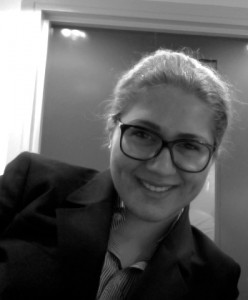
Dilara Alibayova is an undergraduate student at The City Law School who has got involved in a wide variety of pro bono work, in this interview with Emily Allbon she speaks about these different experiences and what they have added to her life.
1. You’ve had a great deal of success securing far from run-of-the-mill pro bono work – could you tell us about how each came about?
It was not down to my skills at the time, I think I was just lucky. The first one, internship at Reprieve, was thanks to your tweet back in April 2011. Ever since I moved to the UK, I wanted to practice my Serbo-Croat and put my knowledge of the region to use.
My letter of interest was pretty much three bullet points on why I want to do that job. The success of securing my place in the Death Penalty team came from motivation to do more, willingness to contribute to the team efforts, and learn.
2. Have you found that the post at Reprieve entailed quite a steep learning curve? Can you tell us what kind of work is involved…
Yes. In fact it still is a learning curve, just perhaps not as steep. I am part of the Death Penalty team, which is one of the three main teams at Reprieve. I work on cases of European nationals (or those who have ties to Europe) on death row in the US. This involves doing the background research on important issues in cases, looking into family history, and mostly collecting records. Sometimes I help with translating documents to/from Russian and Serbo-Croat.
For instance last summer I was allowed to go on an official visit to Croatia. My job was to plan the trip, which although it sounded very straightforward at first, was far from an easy task. While in Croatia my colleague and I met with the Ministry of Foreign and European Affairs, for which we were especially briefed by our supervisors, and spent the rest of our time looking for documents at the archives or trying to find them through various institutions.
As you can see, the work volunteers do depends on their skills as well as their interest.
3. Your legal research skills must be excellent after having to get to grips with another jurisdiction (US)?

That’s very kind of you to say, but I think there is still a lot for me to learn. As volunteers we go through a lot of training before we actually start working on the cases, and throughout our time at Reprieve, staff and fellows keep us up to date through various training sessions and presentations.
It is important for us to know the judicial system of the state that we are dealing with, as well as the basics of International Law. However, because I work on the European side of the cases collecting records and interviewing witnesses, I spend more time studying nationality laws, constitutions and Freedom of Information legislation of the countries I am dealing with. This is where my country specific knowledge becomes very useful.
One thing I have learned though is that the online legal research systems that are available in this country should not be taken for granted!
4. You got involved with the City Enterprise Clinic last year – could you tell us a little about this?
Started by City’s very own David Collins, City Enterprise Services offered advice to small businesses and start-ups from January to April. It was a great opportunity for me to gain an invaluable insight into how Intellectual Property (IP) law is applied in real life and actually meet with clients. As you might have realised by now, at Reprieve I do not have an opportunity to interact with prisoners directly, and instead am simply handed tasks which are emailed to my supervisor by the prisoner’s lawyers. So in that sense, it was incredible to actually interact with clients, to take a look at their prototypes and compare them to the isometric drawings of their competitor’s products, or take a looks at their business plans and figure out where they went wrong. Another thing which I thought was great about the sessions was the short debrief lawyers would give after every client – explaining the issues involved and the possible routes open to them.
5.What kinds of advice did your clients come seeking from you?
The majority of our clients were start-up businesses either looking into ways to protect their ideas or assets, or who were still in the process of bringing their ideas to life whilst making sure they do not infringe any trademarks. In some cases clients had already been running their businesses for quite some time and were merely after some advice on marketing and advertising. I was mainly part of teams which advised on issues of IP and Employment law.
6. What are the key ways in which your pro bono work has offered you new skills, which would not have been possible simply by doing the LLB?
Skills come with practice. I would say the most important one would certainly be confidence – something I greatly lacked and desperately needed before I started work. Other things that I have learned and realised the importance of during the past year would include:
– Filing and organizing – absolutely crucial! It is amazing how much time you can save by simply naming your documents according to the set standard and saving them in the right folders.
– Planning. Taking into account the resources available before taking on a certain task.
– Setting and accomplishing a certain goal/task despite all the no’s and closed doors.
– Being grateful and appreciative of others work. Although this is more of a personal quality, I believe it is an important attribute and key to a successful team. There can never be too many “Thank you’s!”.
7. You are currently working as a paralegal – is this what you imagined it would be?

If I am completely honest, I never imagined myself as an immigration paralegal. I was offered this position by chance, and I decided to give it a try, despite having never even studied Immigration Law.
Being a paralegal is far from what I thought or read about the profession. I think it would be very wrong to say that we do “the dirty job in the office back-rooms”. Paralegals are more like Santa’s elves – we help with research, summarise cases, come up with content for the firm’s website and blog post ideas, which the solicitors then nicely pack and present to clients and firm’s partners.
On my first day as a paralegal I befriended the office scanner and printer – ‘hello career in photocopying’ I thought on the way back home. To my surprise I have spent my second day looking up cases on certain immigration issues at the Law Society Library. The “cherry on top” of my paralegal career so far however (bear in mind it is still only 1 week in…), was day three which I have spent in court and was even introduced to the judge during hearing.
8. Are there difficulties getting the right balance between Uni work and pro bono?
I struggled a lot last year. The work that I do at Reprieve is fast paced – institutions tend to write back within a week, and although some documents take months to be located, other pieces of useful information can be received over a minute long phone call.
University on the other hand is the complete opposite – you study some eight to ten topics throughout the course of seven months, only to sit an exam in May and then wait another month to see if all the hard work paid off. I find it difficult to be motivated by that, which is why I spent more time assisting with various tasks at work. Therefore, balance as such is probably not that difficult to find, it is prioritising that is an issue.
9. Has doing pro bono helped with deciding in which direction you want your career in law to head?
This a difficult question.The work that I currently do as an intern and paralegal in turn, is why I decided to study law initially. However having worked in this sphere for over a year now, I can tell you that knowing that someone else’s life quite literally depends on the work you do, is difficult. I think my heart will always be with human rights work, but my mind is currently set on getting a more permanent position at a commercial law firm. I believe that it is important to try your hand at everything.
For more information on Reprieve’s work please visit the official website or contact Clemency Wells.
